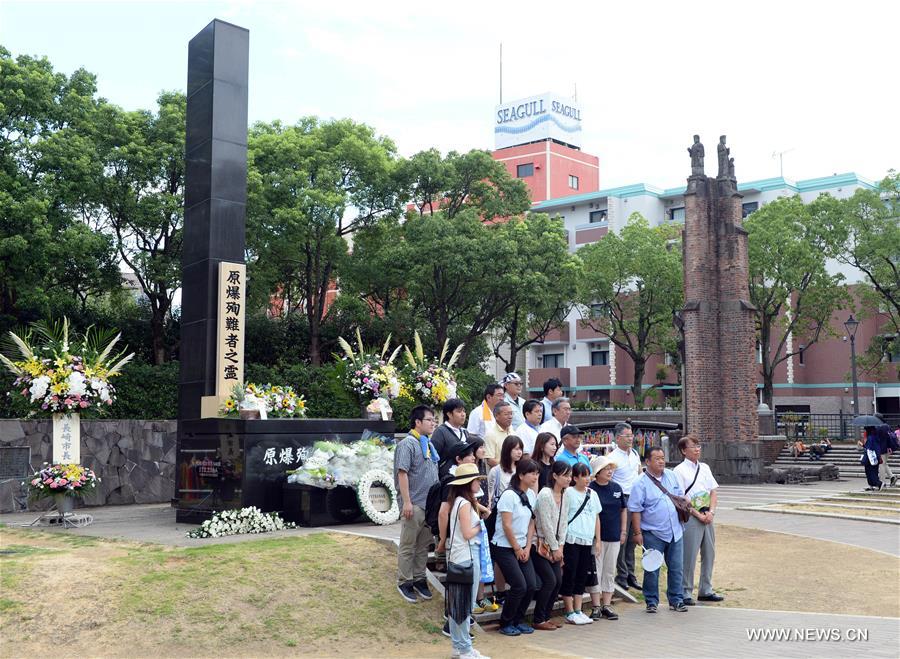
People pose for photos in front of the monument at the atomic bomb hypocenter to commemorate the 71st anniversary of U.S. atomic bombing, at the Peace Park in Nagasaki, on Aug. 9, 2016. To accelerate Japan's surrender in the World War II, the U.S. forces dropped two atomic bombs on Hiroshima and Nagasaki respectively on Aug. 6 and 9, 1945. (Xinhua/Ma Ping)
NAGASAKI, Japan, Aug. 9 (Xinhua) -- Nagasaki, a southwest Japanese city, marked the 71st anniversary of atomic bombing on Tuesday, amid calls from ordinary Japanese people for reflecting on the country's aggression history.
The annual event, held at the city's Peace Park, was itself once again short of any apology to Japan's neighbors for the war crimes committed by the Imperial Japanese Army and also without any reflection on Japan's militarist history of invasion.
Nagasaki was A-bombed on Aug. 9, 1945. Three days earlier, Hiroshima was A-bombed. The United States dropped the two bombs in a bid to accelerate Japan's surrender in WWII.
Japan was a major aggressor that launched wars of aggression against China, Southeast Asian countries and the United States in the 1930s and 1940s. Six days after the Nagasaki bombing, Japan surrendered to the Allied Forces.
Reflecting on the Hiroshima and Nagasaki tragedy, Tokyo has always focused on Japan's much-trumpeted victimhood, evading the fact that the root cause of the U.S. bombings lies in Japan's militaristic aggression and brutal violence against other countries.
At Tuesday's event, Tomihisa Taue, mayor of Nagasaki city, urged the government to enshrine into law its Three Non-Nuclear Principles of not possessing, not producing and not permitting the introduction of nuclear weapons on its soil.
Toyokazu Ihara, representative of atomic bombing survivors, who was nine years old when the bombing took place in Nagasaki, addressed the ceremony, calling on the government to abolish controversial securities bills which are contrary to the country's pacifist constitution and abandon dependence on the U.S. nuclear umbrella.
Prime Minister Shinzo Abe, the revisionist premier and also a hawkish nationalist, also attended the ceremony and delivered a speech. As he stepped up to the platform, angry shouts were heard from the crowd, "Abe Out!"
Abe did not mention the historical background and root cause of the atomic bombings, nor did he offer apology for the war atrocities committed by the Imperial Japanese Army.
Hundreds of people and several Japanese civic groups rallied around the Peace Park, protesting against Abe's attendance at the ceremony and criticizing Abe for his wrong view of history and policies including new security bills.
"We strongly oppose the security-related bills," "Retract the war bills," shouted the protesters, holding banners.
Asai Ryunosuke, a citizen from southwest Japan's Miyazaki prefecture, told Xinhua that "Prime Minister Abe's visit to Nagasaki is an insult to war victims in Japan and Asia," "His abuses on peace memorial is intolerable."
Ryunosuke blamed the Abe administration for not offering apology for or reflecting on the aggression war. "He absolutely does not think the war is wrong in his heart," he added.
The Abe administration rolled out policies including security bills which might trigger wars, adopted hostile attitude to some Asian countries including China and hyped up "threat theory" and "sense of crisis" in order to seek excuse for war preparations, he said.
Referring to a huge stockpile of weapons-grade nuclear materials in Japan, Ryunosuke said Japan's intention to produce nuclear weapons is absolutely clear despite the Abe administration's claim to abandon nuclear weapons.
As for Japan's aggression history, he said Japanese schools do not tell students about it; Japanese media, meanwhile, focuses on suffering of Japan in the war. As a result, most Japanese do not know the country's militarist history of invasion.
"Many Japanese know Japan suffered a lot in the wars, but don't know its Asian neighbors were victimized by Japan's brutal aggression and colonial rule," he said.
Kitahara Hiroki, a citizen from southwest Japan's Fukuoka prefecture, also condemned Abe's historical revisionism, saying millions of people in Asia died in wars waged by Japan and the real reason for Nagasaki tragedy lies in the war of aggression.
Japan has adhered to its post-war tradition of pacifism to avoid mistakes in future, but "Abe is doing exactly the opposite," with the aim to get rid of the postwar system and fundamentally overturn the postwar social form in Japan, he said.
"Amending Japan's pacifist Constitution has been put on agenda now," said Hiroki, stressing that "I'm resolutely opposed to Abe's attendance at today's ceremony."











